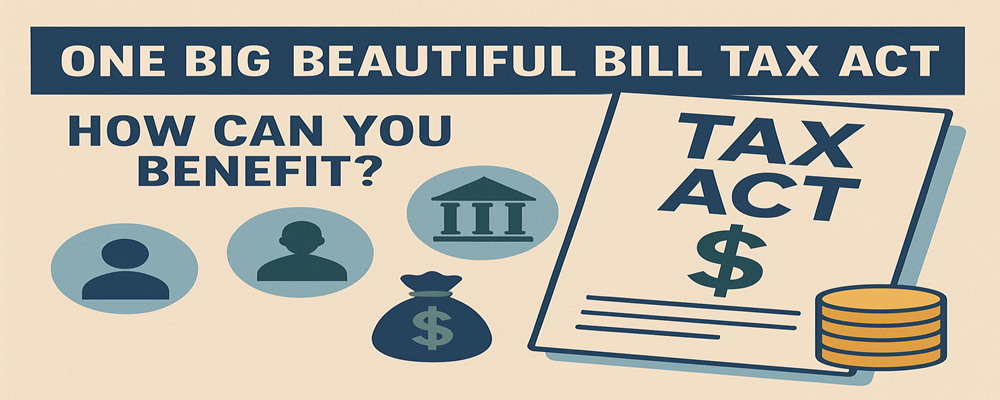One Big Beautiful Bill Tax Act – How Can You Benefit?
Focus: Casualty and Business Losses Deduction
On July 4, 2025 President Donald J. Trump signed into law H.R.1 – One Big Beautiful Bill Act (“OBBBA”). OBBBA contains hundreds of provisions including permanently extending the individual tax rates Trump signed into law in 2017, which were originally set to expire at the end of 2025.
The OBBBA introduces several changes and clarifications regarding casualty and business loss deductions for businesses. A casualty loss is the (1) damage, destruction, or loss of property (2) resulting from an identifiable event that is (3) sudden, unexpected, and unusual.
Prior law
Personal casualty losses, which include theft losses, are temporarily limited under the Tax Cuts and Jobs Act of 2017 (TCJA). In the case of an individual, any personal casualty loss which would otherwise be deductible in tax years 2018 to 2025 is only allowed as a deduction in those years to the extent it is attributable to a federally declared disaster as defined in IRC Sec. 165(i)(5). There is an exception, however, for personal casualty gains during those years. Such gains can be used to offset a personal casualty loss not attributable to a federally declared disaster to the extent the loss does not exceed the gain.
Business casualty losses are not impacted by the TCJA limitations. IRC Sec. 165(c)(1) allows a deduction for an uncompensated loss incurred in a trade or business. To be engaged in a trade or business, an individual must be involved in an activity with continuity and regularity, and the primary purpose for engaging in the activity must be for income or profit. A sporadic activity, a hobby, or an amusement diversion does not qualify. Whether an individual is carrying on a trade or business requires an examination of the facts involved in each case.
Under IRC Sec. 165(c)(2), an individual can deduct losses incurred in any transaction entered into for profit, though not connected with a trade or business. In determining whether a loss was incurred in any transaction entered into for profit, though not connected with a trade or business, courts consider whether the taxpayer’s predominant, primary or principal objective in engaging in the activity was to realize an economic profit independent of tax savings. Reg. Sec. 1.183-2(b) sets forth the following nonexclusive list of factors to be considered in evaluating a taxpayer’s profit objective:
(1) The manner in which the taxpayer carries on the activity;
(2) The expertise of the taxpayer or his advisers;
(3) The time and effort expended by the taxpayer in carrying on the activity;
(4) The expectation that assets used in the activity may appreciate in value;
(5) The success of the taxpayer in carrying on other similar or dissimilar activities;
(6) The taxpayer’s history of income or losses with respect to the activity;
(7) The amount of occasional profits, if any, from the activity;
(8) The financial status of the taxpayer; and
(9) Elements of personal pleasure or recreation.
OBBBA personal casualty losses deduction
Starting on January 1, 2026, OBBBA expands the definition of disasters to include certain state-declared disasters as well. All other limitations and restrictions still apply.
The loss amount is the lesser of the decline in the property’s value due to the casualty (up to your adjusted basis) or the property’s adjusted basis if completely destroyed. The loss must be reduced by any insurance or other reimbursements received or expected. Remember, you must prove both the loss and its amount, including the property’s adjusted basis, pre- and post-casualty value, and any reimbursements received.
OBBBA business casualty loss deduction
OBBBA makes no changes to provisions governing business casualty losses. Taxpayers can generally deduct business casualty losses in the year they occur provided that the lost or damaged property was connected to a trade or business or a transaction entered into for profit.
But Beware……
Regarding business casualty losses, you cannot deduct the loss of future earnings, or your time spent cleaning up after the event. Also, a decline in value due to a casualty without physical damage is generally not deductible.
What Should You Do?
You know that at the Law Offices Of Jeffrey B. Kahn, P.C. we are always thinking of ways that our clients can save on taxes. If you are selected for an audit, stand up to the IRS by getting representation. Tax problems are usually a serious matter and must be handled appropriately so it’s important to that you’ve hired the best lawyer for your particular situation. It’s important to consult with a tax professional for personalized advice on how these changes might affect your specific tax situation. The tax attorneys at the Law Offices Of Jeffrey B. Kahn, P.C. located in Orange County (Irvine), Los Angeles, San Francisco Bay Area (including San Jose and Walnut Creek) and elsewhere in California are highly skilled in handling tax matters and can effectively represent at all levels with the IRS and State Tax Agencies including criminal tax investigations and attempted prosecutions, undisclosed foreign bank accounts and other foreign assets, and unreported foreign income. Also if you are involved in cannabis, check out what a cannabis tax attorney can do for you. And if you are involved in crypto currency, check out what a bitcoin tax attorney can do for you.


 Follow
Follow Follow
Follow
